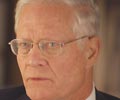Can any of the successful strategies from the Iraq war be translated to the situation in Afghanistan? A roundup of views from those interviewed for this report.
- People
- Dexter Filkins
- Robert D. Kaplan
- Ronald E. Neumann
- Steve Coll
- Henry Crumpton
- Anthony Cordesman
- Lt. Col. John Nagl (Ret.)
- Related Links
- Veteran Compares Iraq, Afghan Wars
Nathaniel C. Fick, a former Marine and fellow at the Center for a New American Security, argues lessons from Iraq cannot be applied blindly in Afghanistan. (NPR, July 17, 2008) - Awakening Movement in Iraq
A description of the Awakening movement and related articles and links from The New York Times. - Professor Nagl's War
A 2004 profile of Lt. Col. John Nagl, who became one of Gen. David Petraeus' top counterinsurgency advisers in Iraq. (The New York Times, Jan. 11, 2004)
Dexter Filkins The New York Times; author, The Forever War

… Can the lessons learned from both the surge and the Anbar Awakening be transferred to the situation in Afghanistan?
Boy. I'd be very skeptical.
Why?
The surge was directed principally at Baghdad. And it's a quarter of the country's population. … That's where most of the sectarian violence was. That's where the civil war started. It was basically the center of gravity for the entire country.
They surged the troops into Baghdad with the idea that if you could bring the violence down in Baghdad it would have a cascading effect across the rest of the country. It actually has to a large extent. They were right about that.
Take Afghanistan: It's unbelievably mountainous. The population, first of all, is much larger in Afghanistan. But there is no center of gravity in the same way that there was in Iraq. The insurgency in Afghanistan is centered in the mountains of the southeast and the deserts of the southwest. So the terrain is completely different. The whole character of the country is totally different.
So if the United States were going to surge into Afghanistan, they'd need not 30,000 more troops, they'd need 300,000 more troops.
Why wouldn't an Awakening strategy in the tribal areas of Pakistan work?
The answer is that the Taliban has decimated the tribes in the tribal areas. I mean, here's a tribal structure that's been in place for hundreds and hundreds of years. They've just killed the tribal leaders. If you just take South Waziristan, which is the heartland of the Taliban of Pakistan, they've killed at least 150 tribal leaders. …
The other thing is that in Iraq, Al Qaeda, in particular, was seen largely as a foreign force. It wasn't really a foreign force. The leadership tended to have a lot of foreigners in it, but Al Qaeda in Mesopotamia was basically Iraqi. But they were seen as outsiders.
In the tribal areas in Pakistan, the Taliban are part of the tribal network. It's just a different bunch of guys who've taken it over. So the Americans would have to go in there and try to untangle all of that. And it's just a much more difficult, much more complicated process. …
Are the troops that are coming out of Iraq prepared for Afghanistan? Is this an easy transference of skills?
There are a lot of troops that have fought in both places. Even 21-year-old corporals have done tours in Iraq and Afghanistan. … I think the mind-set will work in both places, if not the strategy and the tactics -- the counterinsurgency mindset … to kind of befriend the population and to protect them from the insurgents. And to separate them from the insurgents. That's what turned it in Iraq, that kind of philosophy. And that would be very, very useful in Afghanistan, as well.
Everything else is totally different. The terrain's different. The people are different. The culture's different. Everything about it is different.
Robert D. Kaplan The Atlantic Monthly; author, Soldiers of God
I think that the Anbar Awakening is applicable to Afghanistan, in particular to the border region with Pakistan, because there are many new Pakistani Taliban who are fighting for reasons that really have nothing to do with hatred of the United States. They're fighting because in the history of the North-West Frontier [Province] of Pakistan, in the history of Baluchistan and Pakistan, the government in Islamabad … has never built a road. It's never built a school. It's never done anything to give these people a stake in the central government.
Ronald E. Neumann U.S. ambassador to Afghanistan, 2005-'07

There's a certain tendency to try to grab lessons and apply them in cookie-cutter fashion. There are some principles, but there are very few specific lessons from Iraq that you could move to Afghanistan. …
When people talk about the whole business of the Anbar Awakening, that is not something you want to try to replicate in Afghanistan. …
Why not?
Because Anbar is a decentralized group of people who have been opposed to the government, who are not yet in the government, and we're not sure if they're going to be or if they're going to have a civil war when we leave.
There's nothing similar in Afghanistan. And if you were to try to build on local militias, you would be returning to the past that fragmented the country. What brought the Taliban to prominence in large part was the fractious nature of local Afghan militia groups fighting with each other. … So to say that the model is one that we're not even sure yet won't dissolve into civil war ... and that's how you're going to bring peace against the Taliban is some place between crazy and stupid.
What about any relationship between Al Qaeda and the Taliban? Are there splits there that are exploitable?
Maybe in the long run, but not by us. The exploitation in Anbar came between essentially more secular Sunni groups that didn't want to be controlled or repressed and Al Qaeda that was trying to take over. And I talked to people when I was in Iraq [in] 2005. They were telling me that there were conversations between Al Qaeda and nationalist Iraqi resistance that were very up front: "We're working with you now. But we're going to have to get rid of you once we get rid of these foreigners because we're not going to be able to get along." It was very, very clear and up front.
There's nothing like that split in the Al Qaeda/Taliban relationship. And there's no apparent effort of the Al Qaeda people to totally dominate in the same way. Maybe it would come over time. But it's not there now. And I don't see it as being something you could grab hold of.
Steve Coll The New Yorker; author, Ghost Wars
Gen. [David] Petraeus recognizes that Afghanistan is quite a different environment from Iraq and that it's not necessarily going to be amenable to the same tactics and techniques that worked in Iraq.
How is it different?
First of all, it's a much larger geographical territory. It's a much more difficult terrain. The enemy is more dispersed. The enemy is of a different character. The Afghan state is much weaker than the Iraqi state. It doesn't possess the oil revenue and national traditions that have allowed the Iraqi state, although it's weak, to nonetheless, play a rising role in the war. … Additionally, in Afghanistan, the national forces, the army and the police, are far behind where the Iraqi army looks to be at the moment.
And the nature of the war is quite different. You have insurgency that is rooted in 20 or 30 years of continuous conflict, that takes succor from a sanctuary across the border in Pakistan, and that has a call upon rural populations and an ability to intimidate rural populations that is distinct. It's not unique, but it's different from the Iraqi insurgency. …
The idea that you can walk over to Afghanistan and try to arm the tribes against Al Qaeda or against the Taliban is a fallacy. … All counterinsurgencies are born from local conditions and local challenges and local problems. You're going to have to relearn, from the ground up, in Afghanistan how to change security conditions there. …
So an Awakening won't work.
An Awakening is an interesting analogy. … Are there reliable tribes that are already ideologically opposed to Al Qaeda and the Taliban and who can be strengthened, as part of a local approach to counterinsurgency? Possibly. But there is no broad, easy play available to turn some extant tribal structure against the Taliban.
The tribal structure in Afghanistan has been scrambled by 25 years of war. It is not as solid or coherent a social structure as the tribes in Iraq, particularly Sunni Iraq, were. The tribes in Iraq had been instruments of statecraft, continuously, right back to the colonial period. They were an extant entity. So when they turned, they turned with strength.
Henry Crumpton State Department coordinator for counterterrorism, 2005-'07; CIA, 1981-2005
If you see what David Petraeus and his people were able to do in Iraq, there are some parallels: again, working at a very local level, listening to those constituents, those tribal entities. What were their needs? What were their perceptions? And how do you enable them? How do you further their sense of pride and prestige and honor? Those are the keys to victory, whether it's Afghanistan, Iraq, or anywhere. …
Is it a parallel situation? I talked to Steve Coll about this. He says … [in Afghanistan] the tribal structures are much less intact [than in Iraq], and therefore it's harder for a kind of Awakening strategy to get traction.
Again, I would agree. But there are still tribal elements that you can work with. It would not be as clear or as defined as the Sons of Iraq, the Awakening there.
But if you look at the individual tribal leaders and clan leaders in Afghanistan or Pakistan, they want to be empowered. They want to be able to live their lives without external interference, whether it be the U.S. or whether it be some Arab Al Qaeda individual or entity. … You can't draw exact parallels, but there are some basic elements that apply in Iraq, in Afghanistan, [that] are really universal.
And understanding those local needs -- Tip O'Neill, late speaker of the House, he famously said, "All politics is local." I promise you, all counterterrorism, all counterinsurgency is local, whether it's Iraq or Afghanistan, or anywhere.
Let me throw out another criticism we heard from Ambassador [to Afghanistan Ronald] Neumann, who says that [it's] not a good idea to run an Awakening strategy in Afghanistan, because the central government is so weak that you're going to create militias and a further sort of fractioning of power in a country where the central government is not equipped to handle the aftermath.
I tend to disagree with this. I believe that you can work with local leaders and empower them in a counterinsurgency campaign and also look to the future and to find ways to bring them into civil society. Some of the local shura councils, the local tribal councils -- the loya jirga is the term in Afghanistan -- they could be analogous to a city council. They can be part of a future local government. …
But the Awakening was about allowing them to take up arms and fight Al Qaeda, … and this would be a similar situation where we'd empower local tribal leaders, allow them to take up arms and fight [the] Taliban.
Yes, that's what we did in '01 and '02, and it worked pretty well. And I think that you could employ some of those same measures again, now that you do have an Afghan government, with the expectation that they would become part of a local militia that's part of the government, perhaps like our National Guard. Now, maybe that might be a stretch, but I think it's doable.
And, of course what are the alternatives? Do you want to deploy 400,000, half a million U.S. troops there? I would argue no. I think that the Afghan people would respond negatively to that. So why not empower local fighters? …
Anthony Cordesman Center for Strategic and International Studies

We've found in Iraq that our successes -- and they are not by any means guaranteed -- are largely dependent on a strategy we call win, hold, build. [This involves] having lots of small, forward elements of U.S. and other forces to train, to work with local forces on creating a police presence, not just an army presence, on bringing in governance and creating economic opportunities.
Now, in Afghanistan, the fact is there is no government in many areas. At most, there may be a few officials that are competent, a provincial governor or a district leader. There's no ability on the part of the Afghans to manage or conduct aid to handle the build part. And in most areas, there are no aid workers. They can't take the level of risk. They're concentrated in small areas.
These provincial reconstruction teams may hold one or two urban areas in a large province. In general, they are far too small to be effective and [are] basically underresourced. So we find ourselves trying to make a conversion where we do need more troops -- I think most people would say somewhere between two and four brigade equivalents. But we also need far more aid workers. And in the past, we've learned the hard way that we can call for civilian aid workers, but most of the time it has to be people in the military. ...
I want to go back to the Awakening strategy in Iraq. There's talk of applying that strategy with tribes in Afghanistan and/or Pakistan. Can that work?
The Awakening arose because Al Qaeda in Iraq made so many mistakes, treated the people so horribly from its own sect and ethnic group that they reacted on their own. We reinforced that and used it. We provided the money to fund it and deal with the employment issue. We didn't provide arms or uniforms, although we did provide sort of blazers or things that distinguished [them].
And lots of money.
Yes.
But can the Taliban be separated from tribals in Afghanistan in the same way?
Understand, you can't have it both ways. If there is not a climate where the tribes rise up against the Taliban, it's not the same strategy. That's an absolute.
Now, can you have a different strategy, which we attempted to do long before Anbar and the Sons of Iraq? Can you find the tribes that are anti-Taliban? Can you offer them support and advisers? Can you pay them? Can you bring them into some kind of security force?
The answer is perhaps. Because this was tried. There was going to be an auxiliary police force inside Afghanistan. It failed totally. It became corrupt. There was no one to train it.
We're not talking about the coherence of the tribes in Iraq, and they are certainly fragmented enough. But there are tribal confederations which play a major role. There's more of a structure. In Afghanistan, this is often extremely fragmented. You can cross a valley and have villages that hate each other. And they may be within the same tribe.
Now, can you use these divisions in Pakistan or in Afghanistan? There are indications in some areas that you can, but it's not the kind of climate, as yet, where the fundamental criteria that we could exploit inside Iraq exists. They haven't risen up. The Taliban is cruel. It's vicious. But its cruelty has not yet produced that kind of popular reaction or military resistance.
The other issue behind that strategy is … they didn't rise up and have spontaneous success. It took U.S. units, sometimes with only a lieutenant or a captain in charge exposed in forward areas combining the sons of Iraq with Iraqi police with Iraqi army units, with special forces, with U.S. air support. They had to be there. And there had to be people from the reconstruction teams willing to come in and work with them, or military people providing aid directly. There had to be an economic dimension. ...
So if you've been there and you've watched this strategy in practice, you have to understand how complex it is.
Lt. Col. John Nagl (Ret.) Counterinsurgency expert; former adviser to Gen. David Petraeus

There's an old joke that you can't buy an Afghan tribal member, but you can rent him. I think there's some renting we can do that will have big, big effects over the short to medium term.
And then we've got to work the political accommodation over the longer term. We've got to work the strategy with Pakistan. …
And the lessons learned -- clear, hold, build, the Awakening -- these techniques can work in Afghanistan?
These techniques can work in Afghanistan. Afghanistan is actually going to be a harder and a longer war than Iraq has been.
Why?
In Iraq we had an enormously wealthy country that had an experience of working under a central government that did not have, for the Middle East at least, extraordinary ethnic or sectarian divisions.
Afghanistan is the fifth poorest country in the world. The human infrastructure has been destroyed by 40 continuous years of war. … It has never had strong central control. It doesn't have infrastructure, and it doesn't have money. Iraq is bringing in on the order of magnitude, $70, $80 billion a year. Afghanistan is a single digit percentage of that. So Iraq has the resources to rebuild itself if they can garner the political will to do so. And slowly that is happening.
Afghanistan simply doesn't have the resources to do that. So we're starting from below ground zero in Afghanistan. We're not rebuilding a country. We're building a country.



